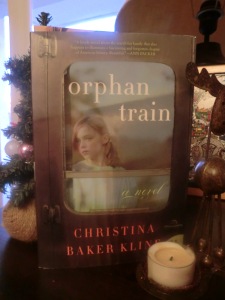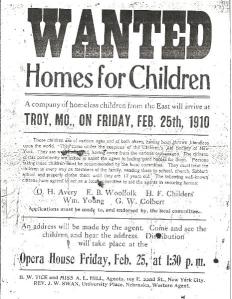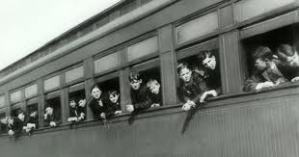I picked this book up knowing I would likely finish it in a couple of days. After a period of slow reading, sometimes we need a faster paced book to get us going again.  Orphan Train by Christina Baker Kline was passed to me by my book buddy and I was warned that it had flaws, and I did notice a definite divide among readers on Goodreads between those who loved it and those who couldn’t get past certain criticisms.
Orphan Train by Christina Baker Kline was passed to me by my book buddy and I was warned that it had flaws, and I did notice a definite divide among readers on Goodreads between those who loved it and those who couldn’t get past certain criticisms.
It is a fascinating story in part because of its little known historical background, that in the Depression era of the late 1920’s, early 1930’s (and as far back as 1854) thousands of abandoned and homeless children were rounded up in New York and coastal cities and taken by train to the Midwest of America, where preceding their journey, posters had been displayed in towns announcing that the train would be passing through. These children were offered to those interested in providing a home for them and on the day the train passed through the children were paraded in front of an interested adult audience.
While some were welcomed and loved, unfortunately, particularly for the older orphans, many experienced hardship and were destined for servitude, babies were more likely to attract those looking to create a family; older children attracted those looking for cheap labour.
 Christina Baker Kline had two grandparents who were orphans, whom she says spoke very little about their experiences and her husband’s grandfather and siblings featured in a non-fiction story called Orphan Train inspiring her to research the subject further.
Christina Baker Kline had two grandparents who were orphans, whom she says spoke very little about their experiences and her husband’s grandfather and siblings featured in a non-fiction story called Orphan Train inspiring her to research the subject further.
The book follows several months in the life of 17-year-old Molly Ayer growing up in Spruce Harbour, Maine who has been in and out of about 20 foster homes already and is spending 50 hours doing community service in the home of 91-year-old Vivian, assisting her clear up her attic and interviewing her for a school project. Spending time in her home and listening to Vivian talk about her early life opens Molly’s mind when she learns Vivian’s childhood was another version to her own. It generates in her a sense of belonging that she has not experienced since her father died in a car accident and she starts to become interested in filling in some of the gaps in Vivian’s story as this unexpected friendship develops.
“In truth, though she hasn’t admitted it out loud until now, Molly has virtually given up on the idea of disposing of anything. After all, what does it matter? Why shouldn’t Vivian’s attic be filled with things that are meaningful to her? The stark truth is that she will die sooner or later. And then professionals will descend on the house, neatly and efficiently separating the valuable from the sentimental, lingering only over items of indeterminate origin or worth. So yes – Molly has begun to view her work at Vivian’s in a different light. Maybe it doesn’t matter how much gets done. Maybe the value is in the process – in touching each item, in naming and identifying, in acknowledging the significance of a cardigan, a pair of children’s boots.”
 In between Molly’s contemporary narrative, the author switches to Vivian’s historical narrative spanning twenty-three years from 1929 when her family first arrive in New York from Galway in Ireland. While the narrative changes from one timeline to the next, there are parallels that connect the two and keep the book from reading like separate narratives. Because Molly meets Vivian quite early on, the juxtaposition of time actually keeps the thread of the story alive, as if we are reading what Molly is hearing.
In between Molly’s contemporary narrative, the author switches to Vivian’s historical narrative spanning twenty-three years from 1929 when her family first arrive in New York from Galway in Ireland. While the narrative changes from one timeline to the next, there are parallels that connect the two and keep the book from reading like separate narratives. Because Molly meets Vivian quite early on, the juxtaposition of time actually keeps the thread of the story alive, as if we are reading what Molly is hearing.
My only criticism was provoked by a nagging question I had over why the story wasn’t more emotionally engaging. There are some significant events and turning points in the story that normally create a cathartic effect, as if the reader were actually experiencing them and American writers in particular do this particularly well. However, upon re-reading I noticed that often at the point where the character shares what is happening, rather than continue with the first person narrative and share the characters dramatic reaction, the first person perspective often changes into the third and looks back at the event, rather than staying and engaging with it. It creates a feeling of detachment and prevents the reader from experiencing the drama, it cuts short what we expect to encounter and halts any feeling of empathy we might have been capable of feeling.
Towards the end of the book, Vivian as a young woman makes a decision that I found surprising and difficult to believe. Usually when we have come to know a character well, their decisions are understood and we develop empathy for the character, even when they make a decision that is counter to our own imagination. I was surprised by Vivian’s decision because despite her experiences, her character development hadn’t suggested to me that she would make such a choice.
Rather than detract from the story though, I think this is something that makes an interesting discussion point, was I the only one to think like this for example? Are the choices that people make, in particular orphans, adoptees and children who have had traumatic childhoods, influenced so predictably by their experiences? Can a writer who has not had such an experience inhabit characters like Molly or Vivian with authenticity?
An excellent read and an insightful look into a lost generation of children whose experience is difficult to imagine.

I am not sure whether or not I will read this book. But I so love and look forward to your reviews. You always uncover the more interesting and thought proving aspects of the books you read. I’ve got to say if there is anyone who makes me want to read a book, it’s you. Thanks!!
LikeLike
Well, you know how I feel about reading reviews, it’s the bibliophile’s version of window shopping, so at least now you can say, “Yes I’ve heard about that one.” 🙂
LikeLike
Absolutely. I like window shopping 🙂
LikeLike
Not so sure this one is my cup of tea but it certainly sounds controversial as to who liked it and who didn’t. This is the first time I’ve heard anyone talk about this book but the subject matter is one of those blights on US history that nobody learns anything about unless it has something to do personally with their family. Your review has me all the same intrigued and may even make an attempt at it one day. Thanks for sharing and broadening my literary horizons. I always look forward to your reviews. On another note, have you read Eat, Pray, and Love? If so, did you enjoy it?
LikeLike
As ever I loved the review. This is an event in American history that I’d never heard of till I read your post – it sounds like a shameful episode on a par with the actions of the British government in sending thousands of children to Australia. I know exactly what you mean about a book closing off the avenue to empathising with a character – DeLillo’s Falling Man that I read did that very thing – but in that book it worked!
LikeLike
Beautiful review, Claire! I didn’t know about this episode in American history. It is difficult for me to describe how I feel about it – it looks to me that the intention behind what happened was good (trying to find orphan children homes where they will be cared for), but what actually happened looks quite sad (insensitively parading them in front of prospective families, the older children ending up in a life of servitude). One of my friends was recommending this book to me sometime back, without telling me what the book was about and so I didn’t think too much about it. But, now, after reading your review, I want to read it. It is sad that the book is not as wonderful as it could have been. I found your analysis – of how the change from the first person narration to the third takes away from of the momentum of the story and makes the reader less engaged with the book – quite insightful and fascinating. Thanks for this wonderful review.
LikeLike
This looks like an interesting book. While the criticism does sound like a lot to get over the content sounds intriguing… Thanks for another wonderful review!
LikeLike
I haven’t read it (although I did read one of her previous books, “Bird in Hand”, and anecdotally the author lives in my town and our kids go to school together…).
Enough people I trust (besides you 🙂 ) did read it, though, and it made enough of an impact on them that they mentioned it, so I do plan to. Recently I came across a really interesting article written about a workshop in which CBK told a bit about her writing journey as well as some ideas on publishing, etc., here: http://www.writerscircleworkshops.com/cmp/events-bestseller.html
LikeLike
The “not emotionally engaging” mention was interesting in the fact that the book obviously elicited no particular emotion from the writer, not even compassion nor empathy, both accredited emotions. I read the book twice. The first attempt related the story of abandoned kids and it left me cold. The second attempt to read the book was marred with emotional interruptions, as I had realized that I had “enjoyed” the same fate as a WW2 France abandoned kid, along with my brother. We survived and made it anyhow. Going thru one of those old rusty Paris RR terminals is an experience we avoid, even to this day…
LikeLike